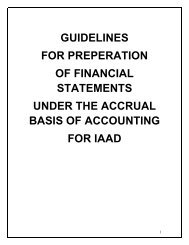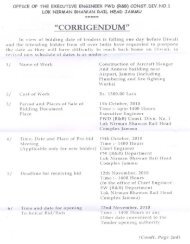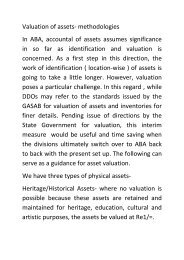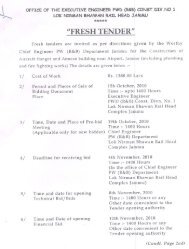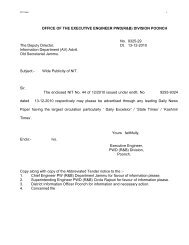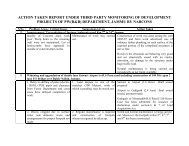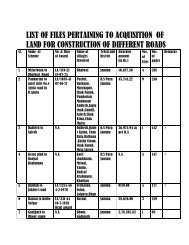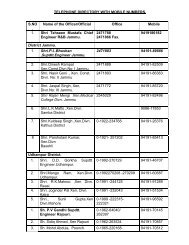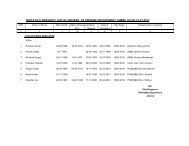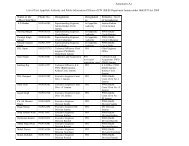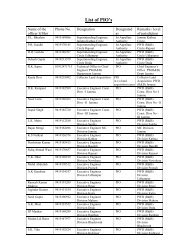Book of Forms - JAMMU & KASHMIR - Public Works Department.
Book of Forms - JAMMU & KASHMIR - Public Works Department.
Book of Forms - JAMMU & KASHMIR - Public Works Department.
Create successful ePaper yourself
Turn your PDF publications into a flip-book with our unique Google optimized e-Paper software.
superior <strong>of</strong>ficer having a cash book on receipt <strong>of</strong> the receipted challan <strong>of</strong> the bank from the<br />
subordinate, as prescribed in paragraph 6.3.4 <strong>of</strong> the C.P.W.A.<br />
4. It is a serious irregularity to draw cheques and deposit them in the cash chest at<br />
the close <strong>of</strong> the year for purpose <strong>of</strong> showing the full amount <strong>of</strong> grant as utilized or to keep the<br />
cash book open after the 31 st <strong>of</strong> March and make disbursements in April entering them in the<br />
cash book as having been made in March.<br />
5. Acknowledgements <strong>of</strong> payments should as far as possible, be taken at the time <strong>of</strong><br />
payment and on one <strong>of</strong> the printed forms prescribed for the purpose. They should be numbered<br />
consecutively in a separate series for each month and the serial number <strong>of</strong> each voucher should<br />
be entered in the cash book as soon as the payment transaction is entered in it.<br />
6. When an imprest is first given the fact should be noted in red ink in the cash book<br />
<strong>of</strong> the Disbursing <strong>of</strong>ficer giving it, in the column “To whom paid”, but the amount should not be<br />
entered as an actual payment as it will still form a portion <strong>of</strong> the cash book balance <strong>of</strong> the<br />
Disbursing Officer making the advance. If, however, a cheque is drawn, its amount must be<br />
shown on both sides <strong>of</strong> the cash book, vide Note 1. Any subsequent increases or decreases in the<br />
amount should be noted, similarly the increases on the payment side and the decreases on the<br />
receipt side.<br />
7. In posting transactions from imprest accounts the recouping Disbursing Officer<br />
should enter in his cash book only the total for each work or head <strong>of</strong> account as brought out in the<br />
abstract, which should be prepared in his own <strong>of</strong>fice, on the reverse <strong>of</strong> the imprest account.<br />
8. All payments must be debited at once to the work or service on account <strong>of</strong> which<br />
they are made. Money advanced to a subordinate for disbursement to labourers, etc., at a distance<br />
should be noted in the cash book in red ink as a temporary advance, in the manner followed when<br />
regular imprests are first made; and when the subordinate returns the duly certified muster rolls,<br />
etc. with the unpaid wages, if any, the amounts actually paid should be debited to the works or<br />
services concerned, the amount unpaid being returned into the cash balance.<br />
9. When an advance on transfer is made to a Government servant from the cash in<br />
the hands <strong>of</strong> the Disbursing Officer pending recoupment when the bill is encashed subsequently,<br />
the amount thus advanced should not be entered as a final transaction in the cash book but<br />
recorded as a temporary advance so that the amount may continue to form part <strong>of</strong> cash balance<br />
for which the Disbursing Officer is responsible.



